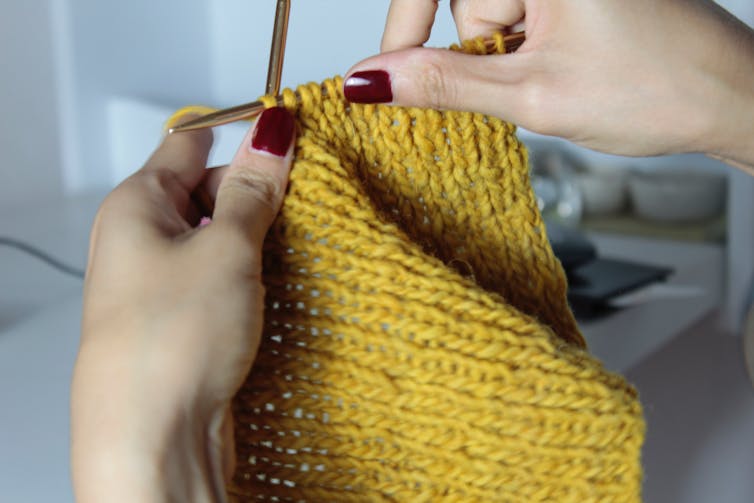Comment | Coronavirus: how to deal with a looming lack of life plans

Clare Holdsworth, Keele University
Coronavirus has brought about an unprecedented global shutdown. China imposed lockdowns in cities in Wuhan and other cities in the province of Hubei from late January, many of which are starting to relax. Much of Europe is under what largely amounts to house arrest. The UK government, meanwhile, recommends stringent social distancing for the most vulnerable for a minimum of 12 weeks. Schools, universities, bars, restaurants, gyms and non-essential shops are closed, with no timetable for reopening.
We can only imagine what the repercussions of this will be. Many of us are gripped by the fear of not knowing what the next days, weeks and months will bring. For the first time, perhaps ever, we are not able to plan ahead. We are all been asked to put life on hold. How are we to do this?
To state the obvious: we must let go of our plans: exams, work trips, holidays – even supper with family who live elsewhere. But this is a very hard thing to do. The practice of planning and setting goals is hardwired in most of us – they are ubiquitous practices of modern life. The first “planner” was published in Philadelphia by an American company Lefax in 1910, and the British Filofax launched in 1921. For many, the paper planner has now been replaced by virtual organisational tools. Planning is how we make sense of time.
The tools of life planning might be fairly recent, but debates about how to organise time and the moral justification for this has dominated philosophical thinking for more than 2,000 years. These revolve around the principle of teleology: the explanation of a phenomenon according to the purposes that it serves. Put simply, that ends justify means.
The ethics of teleology was first developed by the Ancient Greeks, entered the English language in the 18th century, were debated by Kant and then rejected by empirical philosophers in the 20th century. There is still no philosophical consensus about the merits of ends and means.

Philosophers have taken two millennia to debate the merits of teleology. So distilling these philosophical musings into the timeframe of a lockdown is a very difficult thing to do. But, at this unique time in history, these debates have never been more relevant. Coronavirus has obliterated deep-rooted expectations that we can work towards our goals and plan accordingly.
Does this mean we have to reject teleology completely? If so, what can we replace it with? Insights from philosophy and psychology can help navigate this new normal.
Means and ends
The American pragmatic philosopher John Dewey argues that ends and means are actually the same things, and that it makes sense to concentrate on means as these are closest to us. According to Dewey, we should focus on the next action “as the most important end to discover”. Giving up heavy drinking, for example, requires discovering a course of action that has nothing to do with the habit of drinking. In order to reach an end we need to forget about it and fix our attention on the next act to perform.
From a slightly different perspective, the Hungarian-American positive psychologist Mihaly Csikszentmihalyi advises that happiness requires having realisable goals and getting feedback on them. In the absence of long-term planning, feedback can only be realised for goals that are achievable in a condensed time period. Faced with the temporal crisis of a lockdown, this can be aligned with Dewey’s writings about means and ends. In doing so, we can embrace a non-teleological perspective that does not give up on intention. We still need purpose, but this should be directed towards actions that are closest to us.
One way to illustrate what a non-teleological practice might entail can be found in David Sudnow’s insightful description of learning to play improvised jazz piano. By its very definition, jazz piano is not defined by a specific goal: there is no musical score to follow. Sudnow defines jazz as “particular ways of moving from place to place”. To master jazz piano requires intuitive understanding of the fundamental facts of song structure. Sudnow did not master jazz piano through learning to improvise (the end) but through the embodied skills of playing chords and scales (the means).

Time in lockdown
These reflections and observations might help us deal with the need to rapidly reorientate everyday life.
Keep intentions to do things, particularly those that may seem suddenly unnecessary or trivial. Seasoned home-workers are familiar with the importance of morning routines and getting ready for work. Routines are important as they direct us towards moving from one immediate action to another.
Prioritise activities that are achievable and familiar. It might be tempting to use isolation to learn something new, but this can often lead to the frustration of goals that are out of reach. Learning a new skill is exasperating because we struggle to achieve even the first steps. I’ve observed this frustration teaching students to crochet, who initially find it difficult to complete one simple stitch. The tendency is to give up – an outcome to be avoided at the present time.
If you do want to learn a new skill, be prepared for it to happen slowly. And if you have the opportunity, learn collectively – there are increasing opportunities to do so online. There will be greater possibilities for feedback if new activities are done together. Lockdown is not a good time to try and revisit a task or skill that you failed to achieve in the past.
It might be tempting to use this time to embrace the big projects you have been putting off: the great novel to read, craft projects to complete, a book to write. But replacing external long-term plans associated with work and family leisure with existing personal grand challenges might not be productive at this time. To adapt Dewey’s advice, we should focus on in-between projects: start with easier books to read, smaller craft projects and shorter writing projects.
Recognise that some people find it much harder to give up on plans. Young people are particularly vulnerable. Youth is defined by and organised around actions – such as lessons, exams or work experience – that are designed “in-order-to” get you somewhere. These are suddenly not available as teaching stops and examinations are cancelled. Feeling upset and scared is part of the new normal. We need to support not only those that are most at risk from the virus, but those around us who struggle with the new normal of time under lockdown.

Clare Holdsworth, Professor of Social Geography, Keele University
This article is republished from The Conversation under a Creative Commons license. Read the original article.
Most read
- Astronomer from Keele helps take the first close-up picture of a dying star outside our galaxy
- Keele University signs official partnership with Cheshire College South & West
- Keele partners with regional universities to tackle maternity inequalities across the West Midlands
- Keele Business School MBA ranks in Top 40 for sustainability in prestigious global ranking
- Keele trains next generation of radiographers using virtual reality in regional first
Contact us
Andy Cain,
Media Relations Manager
+44 1782 733857
Abby Swift,
Senior Communications Officer
+44 1782 734925
Adam Blakeman,
Press Officer
+44 7775 033274
Ashleigh Williams,
Senior Internal Communications Officer
Strategic Communications and Brand news@keele.ac.uk.

